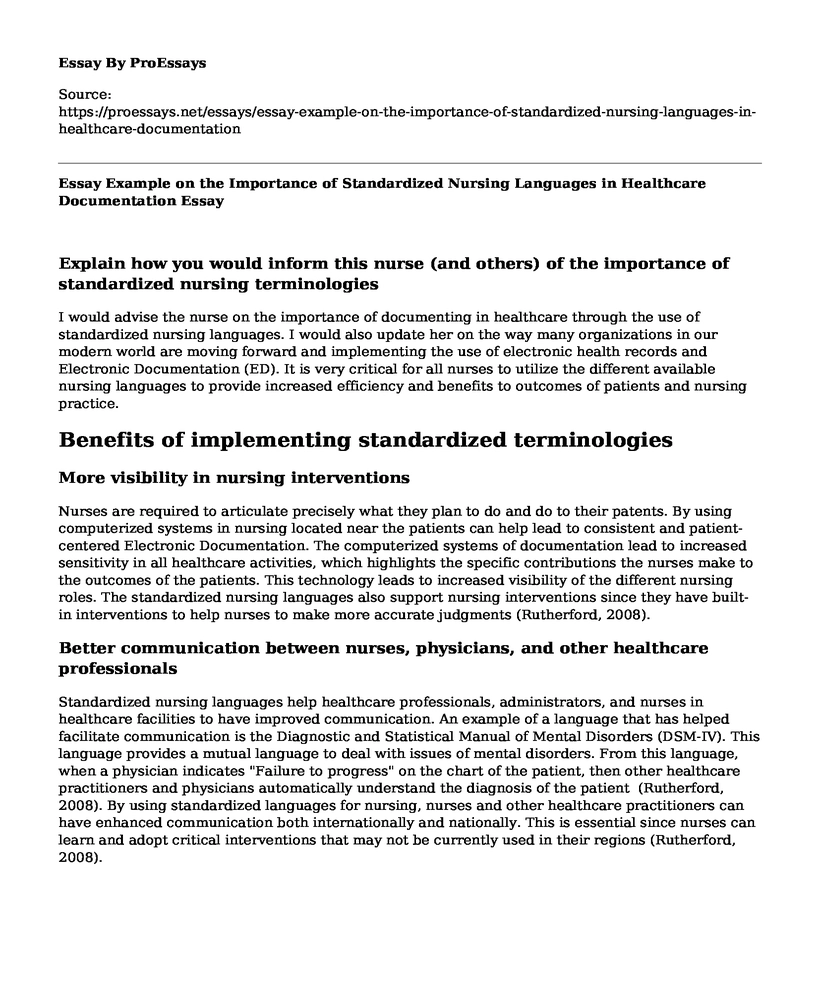Explain how you would inform this nurse (and others) of the importance of standardized nursing terminologies
I would advise the nurse on the importance of documenting in healthcare through the use of standardized nursing languages. I would also update her on the way many organizations in our modern world are moving forward and implementing the use of electronic health records and Electronic Documentation (ED). It is very critical for all nurses to utilize the different available nursing languages to provide increased efficiency and benefits to outcomes of patients and nursing practice.
Benefits of implementing standardized terminologies
More visibility in nursing interventions
Nurses are required to articulate precisely what they plan to do and do to their patents. By using computerized systems in nursing located near the patients can help lead to consistent and patient-centered Electronic Documentation. The computerized systems of documentation lead to increased sensitivity in all healthcare activities, which highlights the specific contributions the nurses make to the outcomes of the patients. This technology leads to increased visibility of the different nursing roles. The standardized nursing languages also support nursing interventions since they have built-in interventions to help nurses to make more accurate judgments (Rutherford, 2008).
Better communication between nurses, physicians, and other healthcare professionals
Standardized nursing languages help healthcare professionals, administrators, and nurses in healthcare facilities to have improved communication. An example of a language that has helped facilitate communication is the Diagnostic and Statistical Manual of Mental Disorders (DSM-IV). This language provides a mutual language to deal with issues of mental disorders. From this language, when a physician indicates "Failure to progress" on the chart of the patient, then other healthcare practitioners and physicians automatically understand the diagnosis of the patient (Rutherford, 2008). By using standardized languages for nursing, nurses and other healthcare practitioners can have enhanced communication both internationally and nationally. This is essential since nurses can learn and adopt critical interventions that may not be currently used in their regions (Rutherford, 2008).
Challenges of implementing standardized nursing terminologies in nursing practice
Lack of alignment because of customized technologies
In regards to Standardized nursing languages in nursing, we have different scales of assessment which represent similar concepts. The lack of forms and tools of evaluation makes it challenging for developers and their consumers to create standardized clinical content. The lack of standardization can be caused by some customers who request to have customized material. This makes it challenging to have a final absolute agreement across the customer base of software developers on a final standardized language (Samuels, 2015).
Other challenges in the implementation of Standardized nursing languages include expensive implementation fees. This is because some Standardized nursing languages change licensing fees while other scales of assessment are copyrighted and the owners to the copyrights charge a fee for the use of their assessment scales. The free Standardized nursing languages also have their challenges since they may not have the necessary resources required for them to perform regular updates and maintenance to the terminologies (Samuels, 2015).
In concussion, it is critical for nurses to have an explicit language to guide and regulate their practice. Standardized terminologies need to be well defined for accurate communication among physicians, nurses, and other healthcare personnel. If vocabulary is standardized using Electronic Documentation, then an extensive database is built; evidence-based healthcare criteria can then be formulated from the database and assist in the evaluation and validation of the nurse's contribution compared to the outcomes of the patients.
References
Rutherford, M. (2008). Standardized nursing language: What does it mean for nursing practice. OJIN: The Online Journal of Issues in Nursing, 13(1), 243-50.
Samuels, J. G., McGrath, R. J., Fetzer, S. J., Mittal, P., & Bourgoine, D. (2015). Using the electronic health record in nursing research: Challenges and opportunities. Western Journal of nursing research, 37(10), 1284-1294.
Cite this page
Essay Example on the Importance of Standardized Nursing Languages in Healthcare Documentation. (2023, Jan 26). Retrieved from https://proessays.net/essays/essay-example-on-the-importance-of-standardized-nursing-languages-in-healthcare-documentation
If you are the original author of this essay and no longer wish to have it published on the ProEssays website, please click below to request its removal:
- Decision Making Analysis and Implementation Plan Paper Example
- What's the Least Amount of Running You Need to Do to Be Healthy? Paper Example
- Prevention of Workplace Violence Essay Example
- Essay Sample on Moral Principles to Moral Dilemmas in Medicine
- Management of Disaster Events
- Essay Example on Secure Healthcare Data Sharing: Benefits & Ethics
- Essay on Management Operations Post-MNC Estab: Report on Rules for Optimal Performance







